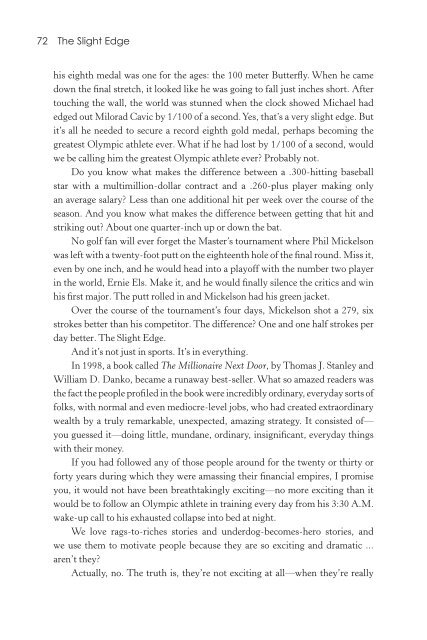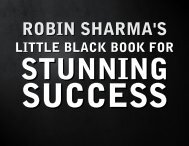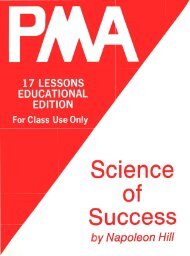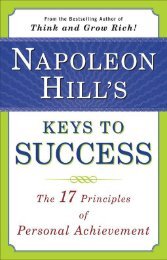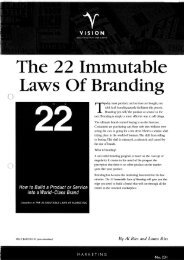The-Slight-Edge
You also want an ePaper? Increase the reach of your titles
YUMPU automatically turns print PDFs into web optimized ePapers that Google loves.
72 <strong>The</strong> <strong>Slight</strong> <strong>Edge</strong><br />
his eighth medal was one for the ages: the 100 meter Butterfly. When he came<br />
down the final stretch, it looked like he was going to fall just inches short. After<br />
touching the wall, the world was stunned when the clock showed Michael had<br />
edged out Milorad Cavic by 1/100 of a second. Yes, that’s a very slight edge. But<br />
it’s all he needed to secure a record eighth gold medal, perhaps becoming the<br />
greatest Olympic athlete ever. What if he had lost by 1/100 of a second, would<br />
we be calling him the greatest Olympic athlete ever? Probably not.<br />
Do you know what makes the difference between a .300-hitting baseball<br />
star with a multimillion-dollar contract and a .260-plus player making only<br />
an average salary? Less than one additional hit per week over the course of the<br />
season. And you know what makes the difference between getting that hit and<br />
striking out? About one quarter-inch up or down the bat.<br />
No golf fan will ever forget the Master’s tournament where Phil Mickelson<br />
was left with a twenty-foot putt on the eighteenth hole of the final round. Miss it,<br />
even by one inch, and he would head into a playoff with the number two player<br />
in the world, Ernie Els. Make it, and he would finally silence the critics and win<br />
his first major. <strong>The</strong> putt rolled in and Mickelson had his green jacket.<br />
Over the course of the tournament’s four days, Mickelson shot a 279, six<br />
strokes better than his competitor. <strong>The</strong> difference? One and one half strokes per<br />
day better. <strong>The</strong> <strong>Slight</strong> <strong>Edge</strong>.<br />
And it’s not just in sports. It’s in everything.<br />
In 1998, a book called <strong>The</strong> Millionaire Next Door, by Thomas J. Stanley and<br />
William D. Danko, became a runaway best-seller. What so amazed readers was<br />
the fact the people profiled in the book were incredibly ordinary, everyday sorts of<br />
folks, with normal and even mediocre-level jobs, who had created extraordinary<br />
wealth by a truly remarkable, unexpected, amazing strategy. It consisted of—<br />
you guessed it—doing little, mundane, ordinary, insignificant, everyday things<br />
with their money.<br />
If you had followed any of those people around for the twenty or thirty or<br />
forty years during which they were amassing their financial empires, I promise<br />
you, it would not have been breathtakingly exciting—no more exciting than it<br />
would be to follow an Olympic athlete in training every day from his 3:30 A.M.<br />
wake-up call to his exhausted collapse into bed at night.<br />
We love rags-to-riches stories and underdog-becomes-hero stories, and<br />
we use them to motivate people because they are so exciting and dramatic ...<br />
aren’t they?<br />
Actually, no. <strong>The</strong> truth is, they’re not exciting at all—when they’re really


